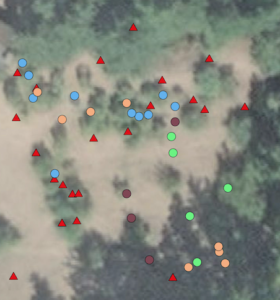||| FROM RICHARD RHOADS for ORCAS ISLAND FOOD BANK |||
A property owner on Orcas Island said, “We are getting older, and it’s just the two of us now. We have so much fruit, we don’t know what to do with it. We could use a little help.”

A small section of the Orcas Island fruit tree map. Red = apple, blue = pear, tan = plum/prune/pluot, green = cherry. There are 10 fruit types in all.
Help is on the way. With the aid of a grant from the Washington State Department of Agriculture, a team consisting of in-the-field mapping coordinator Kathy Morris, data coordinator Scot Devereaux, mapping expert and cartographer Meghan Halabisy, and project creator Amanda Sparks designed a digital map with data on 734 fruit trees on Orcas, most of which are available to the Food Bank for gleaning.
Sparks, executive director of the Food Bank, recognized the need for a gleaning program after seeing demand on the Food Bank increase 227% at one point during the pandemic. (It’s continued to increase since then.) At the same time, Sparks saw the island’s food harvesting areas diminish as land changed hands or became commercialized. Sparks reports, “The agreements between landowners and locals who harvest food from areas all over the island are not always transferred in the sale of property, and many have lost their much-needed food supplies. The Food Bank’s gleaning program will help keep the relationships between landowners and locals alive in a way that appeals to newcomers. Preserving local harvesting relationships is vital to many; losing them also means fewer people know how to harvest. This project has also encouraged a few tree-restorations performed by Kathy’s team. It will be exciting to see it grow over time.”
The map data include tree locations (longitude and latitude), fruit type, gleaning availability, yield history, tree health, and harvesting details. Some of the trees are over 100 years old, going back to the days when Orcas Island was a major commercial fruit producer. A local nursery owner said, “It’s a question of respect for the people who planted these trees. They carried buckets of water to keep these trees alive.”
Although the map is focused on fruit trees, contact with growers will increase the potential for vegetable gleaning and donations of other produce to the Food Bank. “Gleaning” refers to gathering vegetables or fruit left over after a harvest — or, in the case of many of these trees, fruit that would not have been harvested at all. Volunteers have begun gleaning, which will continue through November. This year, Food Bank customers will benefit from an estimated
16,735 pounds of apples, pears, and other fruits. If you are interested in having the gleaning team visit your trees or in volunteering to glean, please contact us, and we will connect you to this year’s gleaning manager. Food donations are tax deductible, and gleaners receive instruction on best practices for harmless harvesting and proper handling. In the future, we intend to offer classes on food processing and preservation. This year we will once again host our annual cider press in late October. Everyone in the community is invited. Join us!
- To volunteer for or schedule gleaning please call (360) 376-4445. Orcas Island Food Bank www.orcasislandfoodbank.org., 116 Madrona Street (PO Box 424), Eastsound, WA 98245
- Hours of food distribution: Monday 3:00 to 6:30, Tuesday and Friday, noon to 6:30
**If you are reading theOrcasonian for free, thank your fellow islanders. If you would like to support theOrcasonian CLICK HERE to set your modestly-priced, voluntary subscription. Otherwise, no worries; we’re happy to share with you.**









Such a great endeavor! Thanks for your leadership, Amanda, and the coordinated efforts of your team to gather this important information and build agreements. This is how to create greater community resilience. We are Orcas Strong.